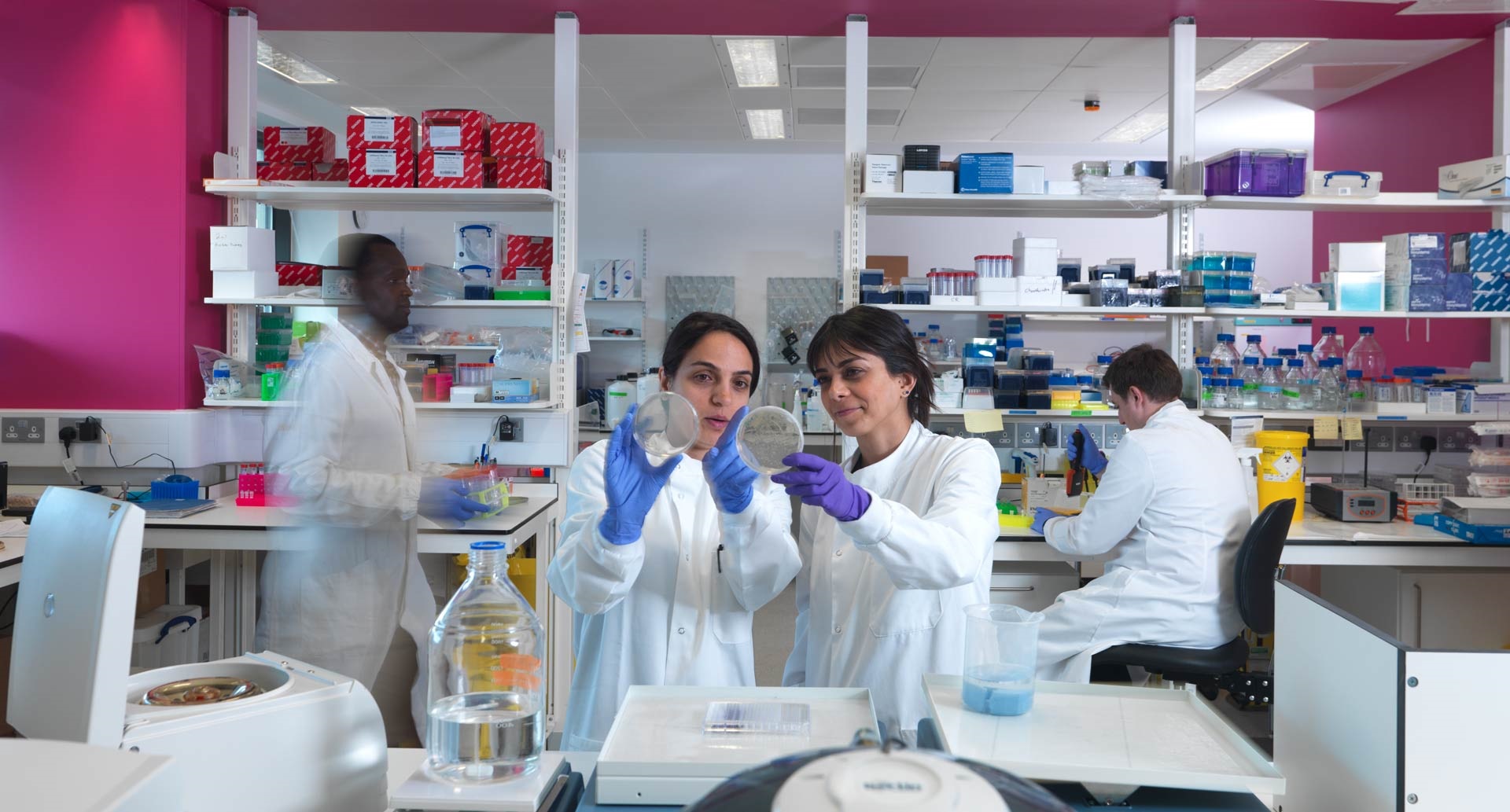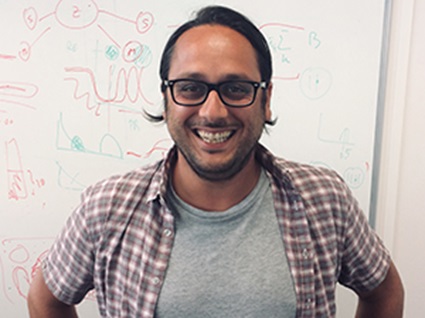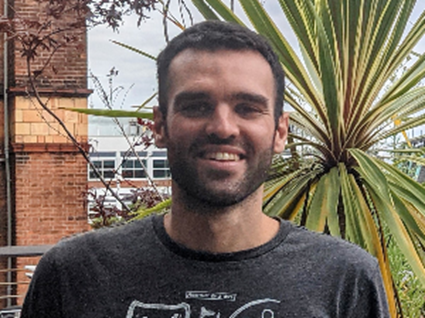Postdocs
As a postdoc at the ICR, you’ll be working at the forefront of cancer research, in an environment that’s collaborative, international and inclusive.
We aim to attract the best scientific minds, wherever in the world they come from. With postdocs from all over the UK and the world, you'll be joining a welcoming community that prioritises training the next generation of world-leading researchers. You’ll also benefit from our strong links with our partner hospital, The Royal Marsden NHS Foundation Trust, as well as our links with companies through industrial partnerships.
Benefits and culture
We offer a competitive salary, rigorous training, many opportunities for professional development, and an open and inclusive working culture. Our PostDoc Association, faculty and learning and development team work closely to support postdocs.
We also offer generous annual leave and family-friendly policies that support parents, including stop the clock, which supports maternity leave during research.
Reimbursing your visa and other costs
Successful applicants will be able to claim the cost of their visa and of the immigration health surcharge (IHS) for themselves and for their dependants once they have joined. This is a taxable benefit. Applicants often find the UK visa application process to be less onerous than for some other countries, such as the United States.
We provide extensive training and development opportunities that will help prepare for your future career inside or outside academia.
Throughout your postdoc fellowship, you’ll be offered training and support to help you to develop your skills in key areas such as high-impact publishing, managing research projects, leadership and career planning.
Getting started
We run training sessions for new postdocs, as well as a postdoc buddy system to help you to settle into your new role. We normally pair you with someone from a different discipline, to broaden your network. We can also try to match you with someone who speaks your native language.
Training and support
As signatories of the Concordat to Support the Career Development of Researchers, we are committed to providing our postdocs with at least 10 days each year for their personal and career development. We offer a wide range of activities that you can tailor to your career stage, research interests and career ambitions. These include:
- On-the-job training – such as shadowing funding panels, grant writing, peer review, supervising and mentoring others, lab visits, committee membership and project-related placements.
- Informal opportunities – such as building professional networks, engaging with the ICR Postdoc Committee, participating in conference organising committees, mentoring (as mentor or mentee), and 1:1 career support with consultants employed by the ICR.
- Formal training and professional development courses – on topics ranging from supervisor training, writing and publishing, and statistics, to project management and entrepreneurship.
The Pathway to Independence – a competitive programme that we run in collaboration with the Wellcome Sanger Institute and CRUK, is also an option for postdocs who are aiming to become academic team leaders.
We also provide training on science communication and outreach to support your participation in our public engagement programme.
You'll be joining a diverse and talented community of postdocs who come to work here from all over the UK and the world.
We’ve around 150 postdocs working at the ICR from across dozens of countries around the world at any one time. Several groups can help you to settle in, build a social network and get involved with life at the ICR.
PostDoc Association
Our Postdoc Association (PDA) brings together postdocs across the ICR for professional and social events, which include away days and conferences. It provides a community for postdocs to feel connected and supported.
Join our networks
From our LGBT+ Network and our forum on race and ethnicity to sports clubs and seminars, you’ll have the chance to connect with like-minded researchers and build your network.
Our active Postdoc and Alumni LinkedIn group is also a great way to connect with others and get answers to common questions – from what it’s like to rent in London to how to set up a UK bank account.
Former ICR postdocs are also welcome to subscribe to Network, our alumni e-newsletter, so they can continue to feel part of our community even after moving on in their careers.
Employee stories
Vacancies at the ICR
Postdoctoral Training Fellow - Endocrine Control Mechanisms
Under the guidance of Professor Cathrin Brisken, we are seeking a highly motivated and ambitious Postdoctoral Training Fellow to combine innovative patient-derived xenograft models and genetic tools to disentangle the role of estrogen and progesterone receptor signaling in breast cancer. The work contributes to gaining more insights into patient-specific hormone dependencies and factors determining them with the aim of personalizing breast cancer therapy and prevention. The successful candidate will be part of a transdisciplinary team of biologists, clinicians and computational scientists and part of close interactions with groups at the ICR, the RMH and King’s College as well Prof. Brisken’s research group at EPFL, Switzerland. About you The successful candidate must have a PhD in biochemistry, pharmacology, cell or molecular biology and demonstrable experience in planning and designing experiments. Ability to write efficient computer code would is desirable. Candidates who are nearing completion of their PhD may apply, but confirmation on awarded PhD is required within 6 months of employment. The ICR has a workforce agreement stating that Postdoctoral Training Fellows can only be employed for up to 7 years as a PTDF at the ICR ( this includes experience gained at PDTF level prior to joining the ICR). For general information on Postdocs at The ICR, more information can be found here. Research Group Information Under the leadership of Professor Cathrin Brisken, The Endocrine Control Mechanisms group are using intraductal mammary gland implantation, and ex vivo studies using breast cancers expanded via intraductal implantation. We also use transcriptomic and proteomic studies to investigate therapeutics for breast cancer patients and improve the development of novel treatment options for them. Directorate Information The Breast Cancer Now Toby Robins Research Centre, within the Division of Breast Cancer Research of the Institute of Cancer Research which is the first centre in the UK entirely devoted to breast cancer research. Our goal is to advance research into the causes, diagnosis and treatment of breast cancer. It is located in state-of-the-art laboratory space, with excellent core facilities and is funded through a long term renewable programme grant from Breast Cancer Now. The Centre is Directed by Clinician Scientist Professor Andrew Tutt, Professor Chris Lord is Deputy Director of the Centre. What we offer A dynamic and supportive research environment Access to state-of-the-art facilities and professional development opportunities Collaboration with leading researchers in the field Competitive salary and pension We encourage all applicants to access the job pack attached for more detailed information regarding this role.
Postdoctoral Training Fellow
Under the leadership of Claudio Alfieri, we are seeking to appoint a Postdoctoral Training Fellow to join the Molecular Mechanisms of Cell Cycle Regulation Group at the Chester Beatty Laboratories, Fulham Road in London. This project aims to investigate the molecular mechanisms of cell cycle regulation by macromolecular complexes involved in cell proliferation decisions, by combining genome engineering, proteomics and in situ structural biology. For general information on Post Doc's at The ICR can be found here. Key Requirements The successful candidate must have a PhD in cellular biochemistry and experience in Cryo-EM and CLEM is desirable. The ICR has a workforce agreement stating that Postdoctoral Training Fellows can only be employed for up to 7 years as PDTF at the ICR, providing total postdoctoral experience (including previous employment at this level elsewhere) does not exceed 7 years Department/Directorate Information: The candidate will work in the Molecular Mechanisms of Cell Cycle Regulation Group within the ICR Division of Structural Biology headed by Prof. Laurence Pearl and Prof. Sebastian Guettler. The division has state-of-the-art facilities for protein expression and biophysics/x-ray crystallography, in particular the Electron Microscopy Facility is equipped with a Glacios 200kV with Falcon 4i detector with Selectris energy filter and the ICR has access to Krios microscopes via eBIC and the LonCEM consortium. We encourage all applicants to access the job pack attached for more detailed information regarding this role. For an informal discussion regarding the role, please contact Claudio Alfieri via Email on [email protected]
Group Leader ICR Clinical Trials and Statistics Unit
Under the leadership of Professor Emma Hall, we are seeking to appoint a Research Group Leader to join The CRUK Clinical Trials and Statistics Unit at the ICR. The ICR-CTSU is a research-led, academic trials unit established in the 1980s. The main objective of the ICR-CTSU is to lead the design, conduct and analysis of multi-centre national and international randomised controlled clinical trials of cancer treatments which will directly influence routine clinical practice within the NHS and worldwide. Key Requirements The successful candidate will ideally have: Higher Degree (MSc or PhD) in Medical Statistics or an allied subject. Significant experience as a biostatistician with a research interest in clinical trials methodology. Broad understanding of cancer research Evidence of intellectual leadership (Career Faculty) Ability to generate research funds to support the group. As part of your online application, you will be required to upload your full CV which will pre-populate your application form, you will also be asked to attach the following documents and failure to do so will mean your application cannot be considered on this occasion: Lists of major publications, achievements, research grants and distinctions. Research plan (five to six pages outlining your current research interests and research programme for the next 5 years). The Research plan would be expected to align to ICR-CTSU objectives and include a focus on a methodological area of research which could be applied to the design or analysis of cancer trials. A PDF of a maximum of five key publications, or other research outputs (e.g. patents) that best demonstrate previous productivity or a single document giving hyperlinks to these outputs. You must also complete the personal statement section of the application form in the format of a cover letter including the names and contact details of three academic referees Department/Directorate Information: Division of Clinical Studies Clinical Trials and Statistics Unit (ICR-CTSU) The ICR-CTSU is a Cancer Research UK-funded, internationally recognised methodologist led clinical trials unit, providing cancer-focused clinical trial research expertise. We lead pioneering, efficient, high-quality, and impactful trials across the phases. Our expertise ranges from experimental medicine early phase studies exploring biological efficacy to trials which may deliver widespread change to routine practice, underpinned by applied methodology to drive forward clinical trial innovation. See our clinical trials Joining as a group leader, you will be given outstanding support to help you to continue to develop in your career. Along with a start-up package of funding, you will also have access to resources to establish your group, including support for recruiting key group members, such as PhD students and postdoctoral researchers. We encourage all applicants to access the job pack attached for more detailed information regarding this role. For an informal discussion regarding the role, please contact Professor Emma Hall ([email protected])
Higher Scientific Officer - Drug Discovery Biology, Centre for Protein Degradation
We are seeking to recruit a Higher Scientific Officer within the Induced Proximity Therapeutics (IPT) Team in the ICR Centre for Protein Degradation to support our molecular glue and PROTAC drug discovery projects and expand induced proximity technology. The IPT team focuses on three main areas of research: Cancer target validation Screening, profiling and molecular mechanism of action of molecular glue and PROTAC degraders Novel E3 ligase biology and ligand discovery The successful candidate will work in a multidisciplinary team and play a key role in target validation, developing in vitro and cell-based assays, and pharmacological characterisation of novel molecular glue degraders and PROTACs, but may also contribute to other activities. About you The successful candidate: Will be a strong team player who is technically minded and passionate about science and cancer drug discovery Will hold a first degree, and preferably a PhD, in biological science or biochemistry Will have experience in cancer biology/target validation, genetic manipulation techniques, in vitro and cell-based assay development and pharmacological compound profiling Experience in targeted protein degradation will be a significant advantage. Department/Directorate Information This position will be based in the ICR's Centre for Protein Degradation, a part of the Centre for Cancer Drug Discovery (CCDD) specialising in developing novel drug modalities that re-wire tumour cells' signalling by targeted degradation of key oncogenic drivers. Our experienced biologists work closely with medicinal chemists, biophysicists, computational scientists, oncology specialists and physicians on discovering new medicines - molecular glue degraders and PROTACs - using innovative screening platforms and characterising their mechanisms of action, as well as expanding the repertoire of novel degradable drug targets and E3 ligases (enzymes that mediate protein degradation). Our research provides a nucleus for the academics and pharmaceutical industry to explore therapeutic potential of targeted protein degradation from laboratory hypothesis-testing to early clinical trials, for the benefit of cancer patients. What we offer A dynamic and supportive research environment in one of the successful academic cancer drug discovery centres in the UK Access to state-of-the-art facilities and professional development Collaboration with leading drug discovery and oncology scientist Competitive salary and pension To learn more about this role, please download the attached job pack. For informal inquiries, please contact Dr Agnieszka Konopacka, Group Leader, Induced Proximity Therapeutics, Centre for Protein Degradation via email: [email protected].


